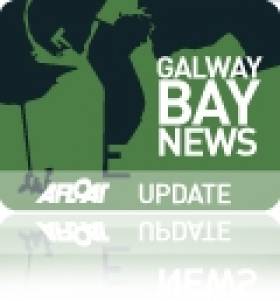Displaying items by tag: Ted Russell Dock
Three’s A Crowd as Naval, Research and Cargo Ships Dock In Galway
Also sharing the basin but located closer to the dock gates was Arklow Shipping Ltd's Dutch registered dry-cargo vessel Arklow Surf (2000/2,316grt). The dock is capable of handling more vessels simultaneously and of course used as a host-port of the high-profile Volvo Ocean Race which is due to return next year.
Galway and neighbouring Limerick City with its Ted Russell Dock, are the only dock-gate accessed ports on the island of Ireland. In the case of Galway there is an exception as freight operations are also available from an outer pier on the seaward side of Dún Aengus Dock though only for domestic purposes. From this pier the dedicated Aran Islands freight service is operated by Lasta Mara TEO's Blath na Mara (1983/330grt). As for Limerick, vessels can also berth outside the dock but they tend to be small port-work related craft that use the outer berth on the Shannon Estuary.
The Galway Harbour Company in recent years have proposed plans for a new outer port, to be built in four stages with a completion date set for 2017. This would enable larger deeper drafted vessels such as tankers and cruiseships to dock in the new port. In the meantime cruiseships anchor off Mutton Island. In addition a freight rail-link, berthing for an inshore fishing fleet and a 216 berth marina are proposed.
To read more about the port proposals visit http://www.galwayharbour.com/news.php?id=11and for aerial visual impressions click HERE.
- River Shannon
- Marine Institute
- naval service
- Ports and Shipping
- Arklow Shipping Ltd
- Ports and Shipping News
- Aran Islands
- Island News
- Galway Bay News
- Marine Science News
- Dun Aengus Dock
- Galway Harbour Company
- Cruise Liner news
- Cruise ships
- Galway Harbour and Bay news
- Ted Russell Dock
- Marine Instistute Research vessels
- Lasta Mara TEO
























































